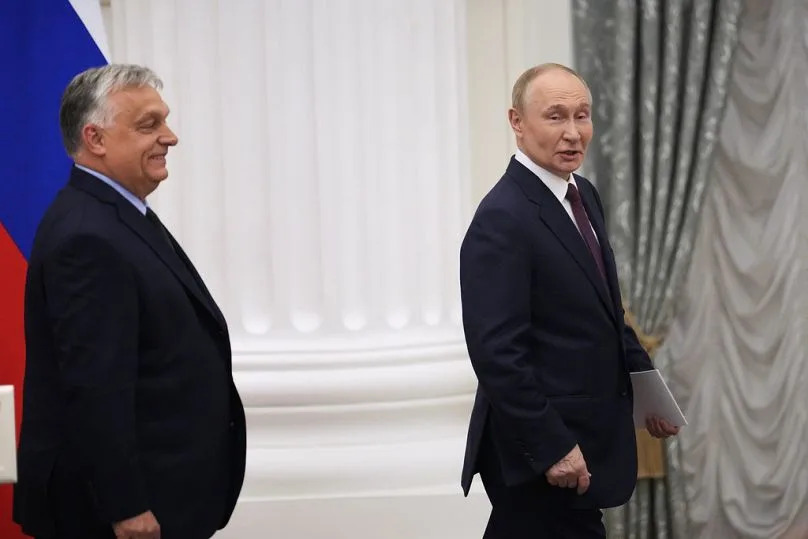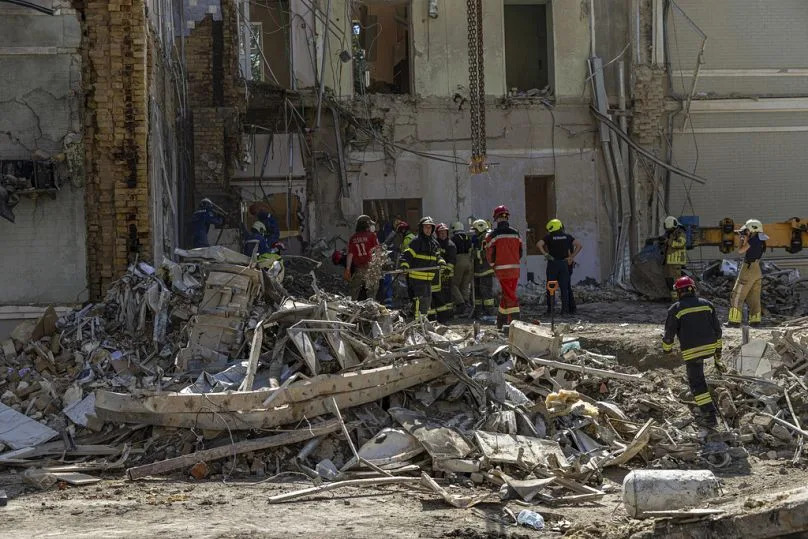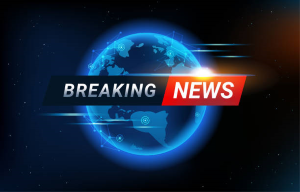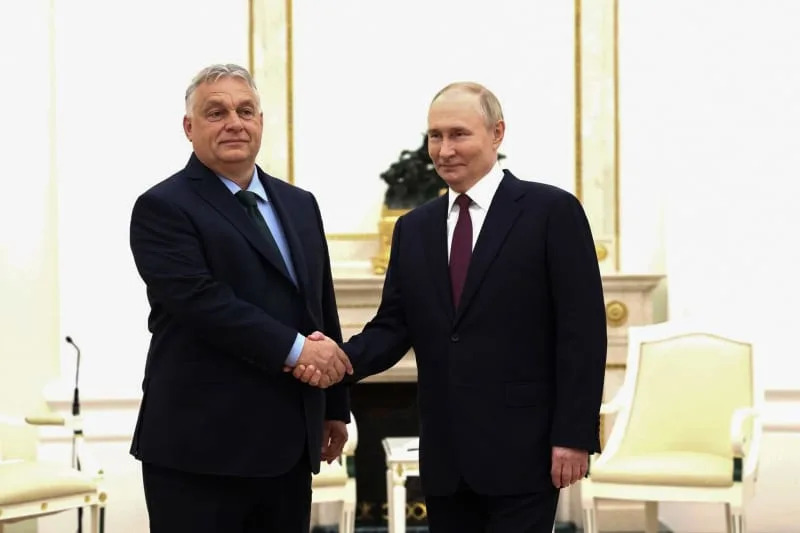Russian President Vladimir Putin (R) shakes hands with Hungary's Prime Minister Viktor Orban during their meeting in Moscow. Hungary's Orban justifies Moscow visit in leaked letter to EU leaders.
Hungarian Prime Minister Viktor Orbán justified his unannounced trip to Russia by citing the economic impact of the Ukraine war on the European Union, in a letter obtained by dpa on Tuesday.
"The negative economic effects of the war place a great burden on the everyday lives of our citizens and on the competitiveness of the EU," Orbán said in the report, dated July 5, and addressed to European Council President Charles Michel and EU leaders.
Orbán visited Moscow to meet Russian President Vladimir Putin immediately after his first visit to Ukraine since the start of the full-scale Russian invasion.
Hungary is viewed in the EU as close to Russia and Orbán's short report adopted wholesale Putin's view of the Ukraine war and shared unrealistically high Russian estimates of Ukrainian casualties.
Putin believes time is on Russia's side in the conflict, Orbán said, and reported the Russian president's surprise that Ukraine had not accepted recent offers of a ceasefire and peace negotiations.
Orbán repeated Putin's expectation of a rapid collapse of Ukraine in the coming months. This is despite a major Russian offensive on Kharkiv grinding to a halt and wider Ukrainian victories in Crimea.
The Russian president has consistently linked conditions he has determined for an end to the war with the idea it would be better to accept them before the situation in Ukraine deteriorates further.
In his letter, the Hungarian premier told fellow EU leaders that based on his talks with Putin, "there is now a greater chance" for a ceasefire and a path towards peace talks."
He urged the bloc to take the initiative in pushing for a ceasefire, as Washington is increasingly focused on the upcoming presidential elections.
"Political leadership provided by the United States is limited, due to the ongoing election campaign," Orbán noted.
AfriPrime App link: FREE to download...
https://www.amazon.com/Africircle-AfriPrime/dp/B0D2M3F2JT
Could Hungarian PM Orbán face consequences for his diplomatic world tour?
Hungarian Prime Minister Viktor Orbán arrived in Beijing on Monday, once again irking his European counterparts.
The visit comes after Orbán first went to Kyiv before an impromptu trip to Moscow to meet with Russian President Vladimir Putin in what Orbán dubbed “Peace Mission 3.0”, causing a diplomatic tempest in European circles.
According to diplomatic sources, the EU is increasingly concerned about Orbán's self-appointed role as a roving European ambassador-slash-negotiator. The consensus is that he should have made it clear that he only represented his own country, not the EU.
Instead, the illiberal Hungarian leader has been quite ambiguous about his position. He has prominently displayed the EU presidency logo in his communiques, and Putin himself referred to Orbán as a representative of the European Council, despite Brussels earlier distancing itself from the "mission".
There is also the matter of simply being in the same room with Putin to discuss Ukraine on his terms, as Brussels and EU member states vehemently oppose the unprovoked full-scale invasion Putin launched in February 2022.
After little more than a week into the Hungarian presidency of the Council of the EU — under the slogan "Make Europe Great Again", a clear reference to former US President Donald Trump's notorious tagline — the tensions couldn't be higher.
"This is a strategic campaign to ridicule the European Union and to show that PM Orbán can make all these uncoordinated moves which are clear violations of the EU's common and agreed positions, and does not have to fear negative consequences,” Daniel Hegedüs, Researcher at the German Marshall Fund, told Euronews.
“On the one hand, this expands his future room for manoeuvre and future political autonomy, but on the other hand it seriously undermines the perception of EU foreign policy among key partners."
Crossing a line
During his trip to Moscow, Orbán bragged that he was the only European leader who could speak with Putin.
“The number of countries that can talk to both warring sides is diminishing,” Orbán said at the press conference in the Kremlin last Friday. “Hungary is slowly becoming the only country in Europe that can speak to everyone.”
But could the Hungarian PM seriously contribute to any peace process between Russia and Ukraine?

"Orbán is the only European head of state or government who is ready to talk to Putin," explained Hegedüs, "violating the basic principle established jointly by EU member states that talking about Ukraine without Ukraine is out of the question. So it is not a question of capacity, but of will.”
Hegedüs did not see "any positive contribution of this kind of wayfaring diplomacy to the solution of the problem of the war in Ukraine" because it "would require the involvement of all partners."
The bloc's top leaders have already condemned Orbán's attempts to conduct diplomatic forays under the EU banner.
As soon as reports of the Moscow trip emerged, President of the European Council Charles Michel hit out at Orbán, reminding him he has "no mandate" to negotiate on behalf of the EU during his tenure.
Josep Borrell, the EU's top diplomat, stressed in a statement issued last Friday that the visit "takes place, exclusively, in the framework of the bilateral relations between Hungary and Russia".
The EU has further means of responding to Orbán's provocations, including asking Michel to raise the possibility of shortening the Hungarian presidency in front of the Council. The question is whether member states are ready to take this route.
However, EU ambassadors are expected to demand explanations during a meeting next Wednesday.
AfriPrime App link: FREE to download...
https://www.amazon.com/Africircle-AfriPrime/dp/B0D2M3F2JT
NATO allies: Orbán's Moscow visit fails to advance peace and unity
NATO allies in Washington are critical of Hungarian Prime Minister Viktor Orbán's overtures to Moscow — neither was any of it helpful nor did it advance the cause of peace, they say.
Others, such as former US Ambassador to NATO Ivo Daalder, say Orbán doesn’t have the clout to be so disruptive.
"Orbán is too insignificant and too small to impact Western security," said Ambassador Daalder.
"Ultimately, he's just not important enough. Ultimately, he's not able to set a different course. Ultimately, he has to accede to where the majority, the large majority, to where most of the people want to go," he told Euronews.
Daalder, now the CEO of the Chicago Council of Global Affairs, spoke on the margins of the NATO summit in Washington, where allies are gathering to mark 75 years of the alliance.
The growing consensus among allies is that Orbán's visit to Moscow was unnecessary and failed to express the reality that Russia is the aggressor and that Ukrainians are suffering as a result of Russian President Vladimir Putin’s actions.
"We don’t find this helpful," said US Special Adviser for Europe at the National Security Council Michael Carpenter. "We don’t see it advancing the peace process and it certainly doesn’t help Ukraine", he told reporters.
"His mission was not coordinated — we knew it was not going to be successful because Putin doesn’t want peace — he wants control over Ukraine".
"Putin proved it to him and us all with the horrendous attack on a children’s hospital in Kyiv," a Ukrainian source told Euronews.

Incoming Dutch Prime Minister Dick Schoof, ahead of his first NATO summit, said Orbán has "no mandate" to speak on behalf of the EU to Putin.
Daalder says the rise of far-right parties is troubling because it threatens the unity and trust needed for NATO and other international institutions to function.
"There is certainly a wind that is blowing pretty strongly towards the far right. And we are seeing that throughout Europe and indeed in the United States in spades," he added.
He said the far-right is not only more authoritarian in its outlook but more nationalist, which goes against the promise of collective security.
"And in a world in which the European Union is all about sharing sovereignty and NATO's all about the idea of collective security, the idea that the security of your neighbour is vital to your own security," he said.
War fought by 40-year-olds
Meanwhile, Daalder says both Ukraine and NATO need to do more to increase the likelihood of Russia being defeated, including mobilising younger men and women to fight in Ukrainian forces.
"Ukraine needs to mobilise manpower. This is a war being fought by 40-year-olds. No other war in history has been fought by 40-year-olds".
"You need to get 18-year-olds, and you need to get 20-year-olds, and you need to get 21-year-olds, which is what every army in the rest of the world relies on’’, he said.
Daalder is also critical of the ambitions of allies for this momentous summit, saying Ukraine should be invited to join the alliance.
"It would have been better if we could have had a more strategic commitment for NATO membership for Ukraine".
"It's not enough to say that they will become a member".
"Russia will not give up its goal of controlling Ukraine unless and until Ukraine is integrated in the Western institutions, in the European Union, NATO," he added.
AfriPrime App link: FREE to download...
https://www.amazon.com/Africircle-AfriPrime/dp/B0D2M3F2JT
Russia and China peace missions prompt EU members to seek ways to punish Hungary
European Union members were looking for ways to punish Hungary on Monday after the country's leader, Viktor Orban, continued his self-described "peace mission" to Beijing under the banner of Budapest's presidency of the bloc.
It came after a controversial visit to the Kremlin last week, where he met Russian President Vladimir Putin and called for an immediate ceasefire in the war in Ukraine, launched by Russia's invasion in February 2022.
Hungary took up the six-month presidency, a rotating and largely administrative role, on July 1.
While the position bestows no foreign policy authority, Orban visited Kyiv, Moscow, Azerbaijan and Beijing in quick succession and on each occasion, posted images using the official logo of Hungary's EU leadership.
On each stop, he has called for an immediate end to hostilities - departing from the EU's official position of considering Russia to be the aggressor and that peace must be made on Ukraine's terms.
"He has no mandate on these visits to represent the EU," European Commission spokesman Eric Mamer told reporters on Monday.
The rotating presidency gives each EU member state a turn at setting legislative agendas and chairing meetings in Brussels, where diplomats thrash out policy minutiae.
The presidency confers no control over EU policy or foreign affairs, but can play a guiding role in prioritising certain legislative points.
At every stop on Orban's tour, fury has spread like wildfire through the Belgian capital. Ambassadors plan to grill Hungary's representatives in Brussels on Wednesday, a diplomatic source said.
"There is growing concerns in the capitals about the self-attributed role of Mr Orban in the so-called peace mission, where it should be clear he is only representing his own country," the diplomat explained.
The Hungarian leader "has intentionally left a lot of ambiguity, while for example displaying the logo of the presidency in his dramatic communications", the diplomat added.
On Monday, some member states were "seriously considering gathering a majority" to come up with a way to punish Budapest for abusing the terms of the rotating role, a senior EU official said, with the European Commission's legal service also preparing to give its opinion.

Orban (left), walking with Russian President Vladimir Putin at the Kremlin in Moscow on Friday, has made Hungary the most pro-Russian voice among EU members since the Ukraine war began in 2022.
Orban's gambit came on the day Chinese military personnel were in Belarus, an ally of Russia's, to conduct "anti-terrorist training" close to Poland's border.
The cumulative effect is a "a message for the region that China is looking at these countries - Belarus, Russia, Hungary, Serbia - with great interest", said Csaba Kancz, a Hungarian geopolitical analyst.
Patience on the continent is also wearing thin over Budapest's blocking of more military support for Ukraine through the European Peace Facility, which has been agreed by the other 26 capitals.
Since Russia invaded Ukraine, Hungary has been the most pro-Russian voice among EU members and has held up various sanctions packages targeting the Kremlin.
"He wants to weaken the EU from the inside," said Peter Kreko of Budapest-based think tank Political Capital, of Orban. "He is frustrated by how Brussels treats him."
Kreko pointed to a litany of grievances Orban held with the EU bureaucracy, including an excessive deficit procedure, "huge fines" for the treatment of refugees, the withholding of EU funds and "lots of criticism".
"He is 100 per cent abusing the role," said Kreko of how Orban was handling the presidency. "He pretends that he's representing the European Union, but does not even inform them about his plans on where he is going."
After Orban met Putin on Friday, EU foreign policy chief Josep Borrell said the Hungarian leader had "not received any mandate from the EU Council to visit Moscow".

European Union foreign policy chief Josep Borrell said Orban had "not received any mandate from the EU Council to visit Moscow".
"Hungary is now the EU member state serving the rotating presidency" of the council until December 31, 2024, continued Borrell in a statement.
"That does not entail any external representation of the union which is [the] responsibility of the president of the European Council at the head-of-state or government level and of the high representative of the union for foreign affairs and security policy at [a] ministerial level."
During his trip to Beijing, Orban posted a picture with Chinese President Xi Jinping bearing the official Hungarian presidency's logo.
"President Xi made it clear to me today that #China will continue its efforts aimed at creating the conditions for #peace. We are not alone! Peace mission to be continued," Orban wrote on X.
The language contrasted sharply with words used by the EU's ambassador to China on Sunday.
"When we look across the Atlantic, we can see our allies, the United States, helping," said Jorge Toledo at a Tsinghua University event. "When we look East and at China, we are seeing a China that is not helping."
According to people briefed on the Orban-Xi meeting, the Hungarian leader dismissed the EU's ongoing support for Ukraine.
He was said instead to have thrown his weight behind China and Brazil's "joint proposal for peace negotiations with the participation of Russia and Ukraine", launched in May.
"That is very much out of line," the senior official said. "I think people are taken aback by how brutal the first week [of the presidency] has been."

Ukrainian rescuers, medical staff and volunteers clean up the rubble and search for victims after a Russian missile hit the country's main children's hospital in Kyiv on Monday.
As Orban met Xi, news was emerging of a major Russian missile attack across Ukraine that killed at least 31 people. One missile struck a large children's hospital in Kyiv.
"I wonder how the peace dove feels today seeing the attacks on Kyiv," the official quipped.
Sources in Budapest and Brussels said the next stop on Orban's self-described "peace mission" would be a tete-a-tete with ex-US president Donald Trump this week on the margins of the annual NATO summit in Washington.
In an interview with German newspaper Welt before he left for China, Orban was defiant.
"War does not fall from the sky. War is the result of the decision of certain people," he said in response to a question about Russia wanting to retain control of occupied Ukrainian territories.
"How are China, the United States and the EU going about it? China has a peace plan. America has a war policy. And Europe, instead of having its own strategic approach, is simply copying the American position."
Sebestyen Hompot of the Central European Institute of Asian Studies suggested the tour was broadly aimed at the right-wing populist group his Fidesz party helped form in the European Parliament this week.
Patriots for Europe, the new far-right group, is now the chamber's third-largest.
"This is part of building his image among other populists in Europe," Hompot said. "We can count on Orban taking every opportunity to emphasise his role as a leader of the alternative, populist right in Europe, to reform in his view, the EU."
AfriPrime App link: FREE to download...
https://www.amazon.com/Africircle-AfriPrime/dp/B0D2M3F2JT
Orbán's big Hungarian presidency speech blocked by European Parliament
Attempts by Hungarian premier Viktor Orbán to address MEPs at the inaugural plenary sitting of the newly elected assembly in Strasbourg have been rebuffed by parliamentary chiefs unable to find room to accommodate him in the agenda, two sources familiar with the issue have told Euronews.
By long-standing convention, heads of government are given the opportunity to address the Parliament when they take over the rotating presidency of the EU Council, presenting the agenda for their six-month turn at the helm of inter-governmental policy negotiations and answering questions from MEPs.
The sources said Orbán had indicated to the parliament that he could appear before the plenary on Tuesday or Wednesday (16-17 July) next week to present the agenda of the Hungarian presidency, which Budapest has given the slogan ‘Make Europe Great Again’.
However the Conference of the Presidents - the heads of the political groups who determine the agenda - said that the Parliament did not have space in the schedule at that time, both sources agreed.
The first source told Euronews that the Parliament’s business is more than usually busy, blaming the Council for not heeding the advice of the Parliament on the timing of the European elections.
“Five years ago, in 2019, we were able to accommodate the incoming Finnish presidency during the last summer plenary because the elections were held in May, enabling us to hold two plenaries before the summer,” the source said. “We warned that a June election would have consequences for our schedule.”
The first source added that the new parliament needed to constitute itself by voting in the president and fourteen vice-presidents, for which Tuesday and Wednesday need to be kept available.
Thursday is being held open for the confirmatory vote on Ursula von der Leyen’s reappointment as European Commission president. Friday – while theoretically available, was not possible for Orban, according to the first source.
The agenda for next week’s plenary will be finalised this Thursday (11 July) during a conference of the presidents of the parliamentary groups. “It is possible that there could be a last-minute accommodation,” the first source added.
But a spokesperson confirmed that the July plenary sessions was being reserved for “the Parliament’s constitution and election of the European Commission President (pending confirmation by the Conference of Presidents on Thursday)”.
The Hungarian presidency was therefore unlikely to present its programme to MEPs before September, the spokesperson told Euronews.
Orbán has proclaimed himself the one EU leader on friendly terms with the world's two pre-eminent authoritarian governments, and paid unexpected visits to Russia and China in recent days to discuss a peace settlement for Ukraine, after meeting the Ukrainian president in Kyiv.
He is expected in the US tomorrow for the 75th anniversary summit of NATO.
Orbán’s visit to Moscow triggered condemnation from Ukraine and other European leaders, but the Hungarian premier justified the trip as an outreach effort.
"The number of countries that can talk to both warring sides is diminishing," he said. "Hungary is slowly becoming the only country in Europe that can speak to everyone.”
Spokespersons for the Hungarian government did not reply to a request for comment.
AfriPrime App link: FREE to download...



